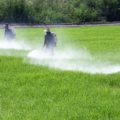
If you're like millions of American men, women and children, you likely have at least one allergy sensitivity. You may have seasonal allergies, reacting to pollen from trees, grass and weeds. Or perhaps you experience symptoms after exposure to indoor allergens like dust mites or pet dander.
If your symptoms are particularly severe, you may be at risk of anaphylaxis, an extreme physical reaction to an allergen. According to the National Institutes of Health (NIH), anaphylaxis is an extreme reaction involving your entire body. High amounts of histamine might cause difficulty breathing, severe discomfort, nausea, swelling, wheezing, hives and other symptoms. Anaphylaxis can result in a rapid death if not treated immediately. People at risk of anaphylaxis should immediately consult with a doctor about possibly carrying at least two doses of injectable epinephrine. (One dose may not be enough to stop a reaction.)
The good news for seasonal allergy sufferers: the NIH reports that pollen sensitivities rarely cause anaphylactic reactions. Here are some of the deadliest allergies, as reported by Weather.com:
- Bees: While no one likes being stung by bees, some people are actually allergic to the insects.
- "Deaths from allergic reactions are uncommon, but tragically, they do occur," allergist Dr. Amber Patterson told Weather.com. "We most commonly hear about deaths related to severe allergic reactions to food or insect venom."
- Food: Allergies to foods like peanuts, dairy, eggs, soy, wheat and seafood can range from mild to deadly.
- Penicillin: According to the Journal of the American Medical Association, penicillin is to blame for three out of four fatal anaphylactic cases in the United States.
Visit the Allergy Be Gone website to shop a wide variety of allergy control products that can help you minimize your allergy symptoms.









